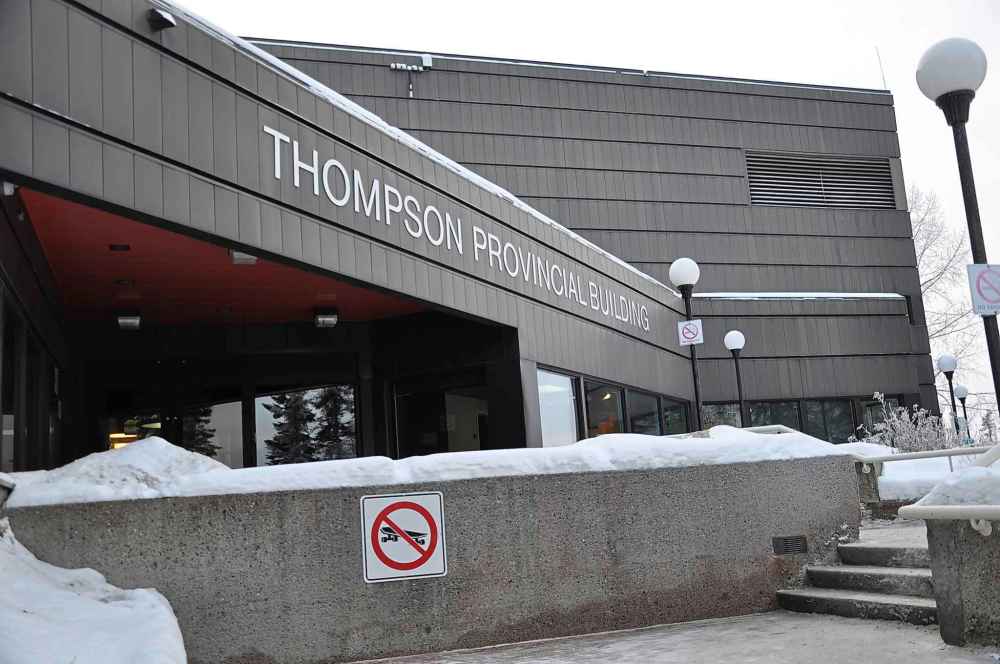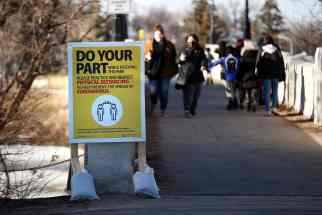Court changes could aid northern justice
Read this article for free:
or
Already have an account? Log in here »
To continue reading, please subscribe:
Monthly Digital Subscription
$0 for the first 4 weeks*
- Enjoy unlimited reading on winnipegfreepress.com
- Read the E-Edition, our digital replica newspaper
- Access News Break, our award-winning app
- Play interactive puzzles
*No charge for 4 weeks then price increases to the regular rate of $19.00 plus GST every four weeks. Offer available to new and qualified returning subscribers only. Cancel any time.
Monthly Digital Subscription
$4.75/week*
- Enjoy unlimited reading on winnipegfreepress.com
- Read the E-Edition, our digital replica newspaper
- Access News Break, our award-winning app
- Play interactive puzzles
*Billed as $19 plus GST every four weeks. Cancel any time.
To continue reading, please subscribe:
Add Free Press access to your Brandon Sun subscription for only an additional
$1 for the first 4 weeks*
*Your next subscription payment will increase by $1.00 and you will be charged $16.99 plus GST for four weeks. After four weeks, your payment will increase to $23.99 plus GST every four weeks.
Read unlimited articles for free today:
or
Already have an account? Log in here »
Hey there, time traveller!
This article was published 14/04/2020 (2064 days ago), so information in it may no longer be current.
Manitoba Justice has proven commendably creative in adapting bail hearings and other routine court proceedings to heed the dictates of social distancing. These innovations bode well for the ongoing problem of offering efficient justice in northern Manitoba.
Court dysfunction has existed 'forever' for northern Indigenous people

Posted:
A groundbreaking legal decision bearing his name has earned national attention for exposing "so pervasive, so insidious" problems with bail court in northern Manitoba. But at home in Split Lake, nothing has changed for Dwayne Young. He can't rewind back to a time before his rights were violated.
If necessity is the mother of invention, the current state of emergency has given birth to ingenious ways for Manitoba’s courts to allow more teleconferencing, video hearings and innovative bail applications.
The legal system is a cornerstone of a civil society and, as an essential service, justice must continue to be done. But, as several weeks of pandemic pressures have proven, that doesn’t necessarily mean crowding courtrooms with lawyers, judges, accused people, guards, clerks and spectators.
As Manitoba Court of Appeal Chief Justice Richard Chartier put it, “We are well-aware we have to balance our institutional obligations with the broader public health concerns.”
The bail triage process has been changed so housebound lawyers can be emailed case details instead of appearing in court to get this information.
Many links in the chain of justice — including routine remands, bail hearings, guilty pleas and sentencing decisions — are now conducted via video link involving a judge, a prosecutor, a defence lawyer and the accused, who can participate from behind bars. A side benefit is that the accused person doesn’t have to be transported between the penal institution and court, a process that can take hours and involve numerous correctional staff, possibly in contravention of social distancing guidelines.

For security purposes, the teleconferencing employed by Manitoba Justice is password protected. It wouldn’t do to use a popular app such as Zoom, which has proven to be easily violated by hackers armed with malicious content.
It was likely challenging for Manitoba Justice administrators to hastily arrange the move to digital on the relatively short notice offered by an approaching pandemic. They deserve credit for their innovation and flexibility, a display of ingenuity that offers hope that this can-do attitude can finally pave the way for overdue changes to the justice system — or, some might say, the injustice system — in northern Manitoba.
A Free Press series late last year detailed systemic problems with northern courts, including stories of how the charter rights of two northern Manitobans were violated because they spent 51 days and 23 days, respectively, in custody without a bail hearing. It’s a long-standing problem that people in remote communities are often denied timely access to legal help and court hearings, and observers have repeatedly recommended the long-overdue expansion of remote internet services that would allow Manitoba Justice to make better use of digital alternatives.
No one is suggesting full-blown trials should be held virtually. Trials can last for several days, which would be a punishing length of time to endure talking heads on a screen, particularly for members of a jury. Also, the nuances of participants in a trial — body language, facial expressions and the dynamics of exchanges — can’t yet be fully transmitted by current digital technology to the degree that would ensure a fair trial.
It was likely challenging for Manitoba Justice administrators to hastily arrange the move to digital on the relatively short notice offered by an approaching pandemic. They deserve credit for their innovation and flexibility.
But trials are a relatively small percentage of the items listed on court dockets. Most items are administrative matters as routine as remands, but they can also be as crucial as bail applications.
Under threat of COVID-19, Manitoba Justice has shown many legal matters can be handled without crowding a bunch of people into one room. The next step will be to apply the learned lessons to northern Manitoba.
It’s encouraging to think the innovations forced by social distancing might also be used to overcome the challenges of geographical distance.






